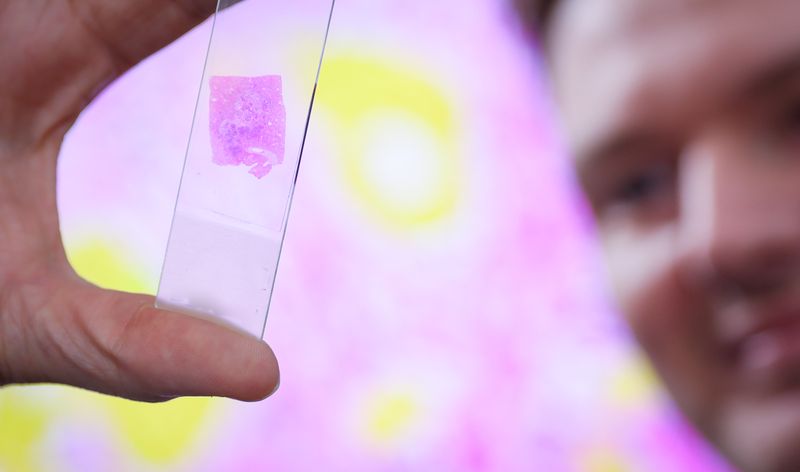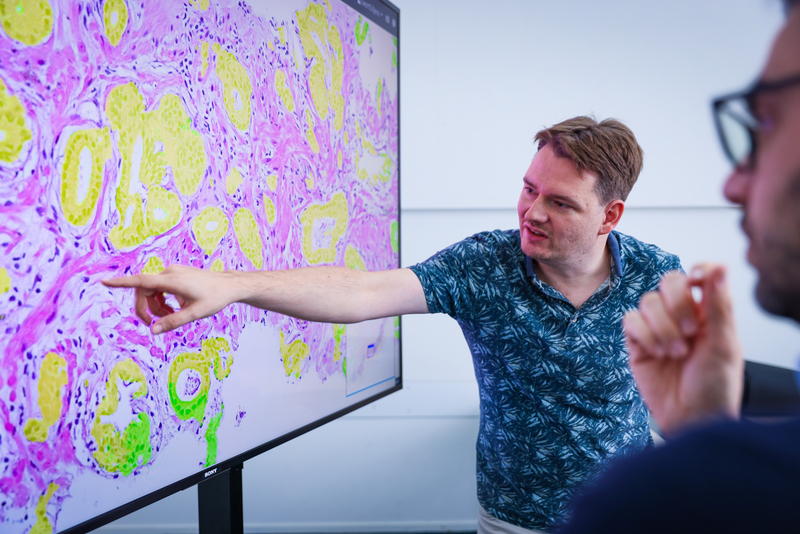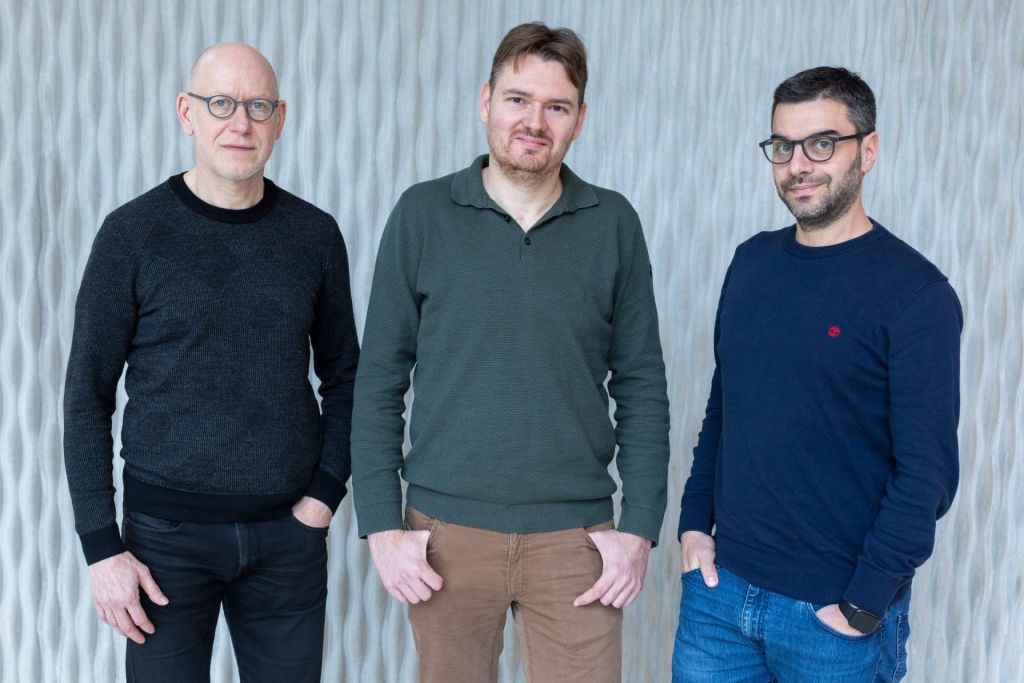-
 Onderzoeker Geert Litjens aan het werk. Bron: Radboudumc
Onderzoeker Geert Litjens aan het werk. Bron: Radboudumc
Diagnosing tumours better and faster by using Artificial Intelligence. Radboudumc researchers Jeroen van der Laak, Francesco Ciompi, and Geert Litjens are developing AI models that do exactly that. For their efforts, they received the Ammodo Science Award. They want to use the 1.6-million-euro reward to develop the world’s first virtual pathologist.
Helping doctors to improve the treatment of their patients; that is the goal of Radboudumc researchers Jeroen van der Laak, Francesco Ciompi, and Geert Litjens, who jointly form the Computational Pathology Group. The trio developed models based on Artificial Intelligence (AI), which pathologists can use to diagnose diseases like cancer quicker and more accurately. This is a welcome development in a healthcare system under pressure from rising costs and an ageing population.
And yet, when asked if his team’s AI models will really improve treatments, researcher Van der Laak’s answer is very modest: ‘We are scientists, so we are very careful. It’s a rather large claim to make, but yes, that is the goal.’
Cancer, yes or no
The Computational Pathology Group develops software models based on AI, that can help pathologists in diagnosing diseases like cancer. The group creates AI models by training algorithms using large digital datasets, filled with images of thousands of patients, often collected from all around the world. Those models can carefully analyse digitised images of diseased tissue, and make diagnoses and prognoses based on that.
The Group was the first in the world to demonstrate that AI can match – and even exceed – human experts when it comes to judging the severity of breast and prostate cancer.
‘The AI models we build can help pathologists to be more efficient’, explains Van der Laak. ‘A pathologist uses images to determine the presence of cancer and analyses the specific characteristics in the image. Because the algorithm can quickly determine the relevant parts, the pathologist can handle more cases in the same amount of time.’
‘Sometimes it happens that one pathologist diagnoses prostate cancer, while another one does not’
Another advantage of AI is its consistency. ‘If you ask five different pathologists to look at the same image, you may not always get the same five answers’, Van der Laak explains. Experience, prior knowledge, but also how rested someone is on any given workday; all factors that can influence judgment. Van der Laak: ‘Sometimes it happens that one pathologist diagnoses prostate cancer, while another one does not. That can result in the removal of someone’s prostate.’
These are exceptional cases, the researcher emphasises, but they do happen in practice. ‘Not only that: the pathologist needs to judge the severity of the cancer, ranging from mild to very aggressive. This is where opinions between pathologists differ even more.’ This, too, can result in someone undergoing a difficult procedure that proves to have been unnecessary, or its other extreme: that people are too hesitant to use more invasive procedures in a timely manner.

Virtual pathologist
Results become a lot more consistent with an AI-model co-pilot. ‘Based on the same information, a model will reach the same conclusion every time. A computer is never in a bad or low-energy mood’, says Van der Laak.
The researchers want to use the Ammodo Science Award’s 1.6 million euros to develop one of the world’s first ‘virtual pathologists’: ANTONI; named for Antoni van Leeuwenhoek, the Dutch microbiologist who designed the first microscopes.
Eventually, this virtual pathologist will be able to make its own independent diagnoses of various tissues, including colon, prostate, and breast cancer. What makes ANTONI so special is that medical specialists can ask for the reasoning behind its results, to help support their diagnoses.
‘AI still makes mistakes’
However, Ciompi does not expect that ANTONI will start making blind, fully automated diagnoses in the future. ‘Artificial intelligence can find information in images that our own visual systems cannot, but it still makes mistakes’, according to Ciompi.
‘That is why the pathologist remains in charge. ANTONI assists and makes suggestions. This kind of tool can be a massive bonus to doctors, but there will always be a final check by the pathologist. That is also important when it comes to accountability.’
Another danger of the proliferation of AI tools is that pathologists might not sharpen their own judgment and skills to the same level or might even lose them. Van der Laak: ‘You can compare that to our ability to navigate an unfamiliar town. Since the introduction of Google Maps, a lot of us have lost that ability. We are still considering how to prevent or at least limit that risk.’
Medical field
Although the idea that AI will have a major impact in the medical field has been around for a while, the tools have not yet seen broad application. There are various reasons for this, according to Ciompi: ‘Integrating these possibilities costs a lot of money, and we are still not sure who is going to pay for it. Additionally, a lot of people don’t know how to use them, or they’re afraid to use them; we can still make a lot of gains in that area.’
Another area with a lot to gain involves less affluent countries. A lot of things developed by the Nijmegen researchers may have more long-term consequences there than within our own borders. ‘We have highly developed diagnostics, but in India, China, or Africa there are too few pathologists. Someone can get a breast amputated, without a pathologist’s confirmation of cancer. Anything that can be done with AI will be a huge benefit.’
‘I like that this prize appreciates communal science’
Although the recipients of the Ammodo Awards were only announced today, Van der Laak, Litjens, and Ciompi already knew they were some of the lucky ones. The funds won’t become available until June, but the researchers won’t remain idle until then. Ciompi: ‘We need multidisciplinary expertise to work on this, so we will be on the lookout for researchers and engineers.’

The three researchers are pleased to see the award going to a group effort, rather than to a single star-researcher as is usually the case. Van der Laak: ‘We have a research group of roughly 35 people, led by the three of us. I like that this prize appreciates that communal science.’
Ciompi finds it extraordinary that this is an award in the life sciences: ‘All three of us have a technical background; I think that this award is a nice recognition of the impact that our work has on the medical field.’
Ammodo Science Award 2024
The Ammodo Science Award for groundbreaking research is awarded to research that is ‘internationally recognised, state-of-the-art, potentially groundbreaking, and performed in groups.’ This year’s other winners besides the Computational Pathology Group are: Group Past ❤ Play (Leiden University); the Lipidomics Team (University of Groningen); and Psychological Methods Lab (University of Amsterdam).
The domains of Natural Sciences and Biomedical Sciences received a sum of 1.600.000 eros, while the domains Humanities and Social Sciences received 800.000 euros. The teams can use the money to explore new areas of research over the coming years.
Translated by Jasper Pesch



